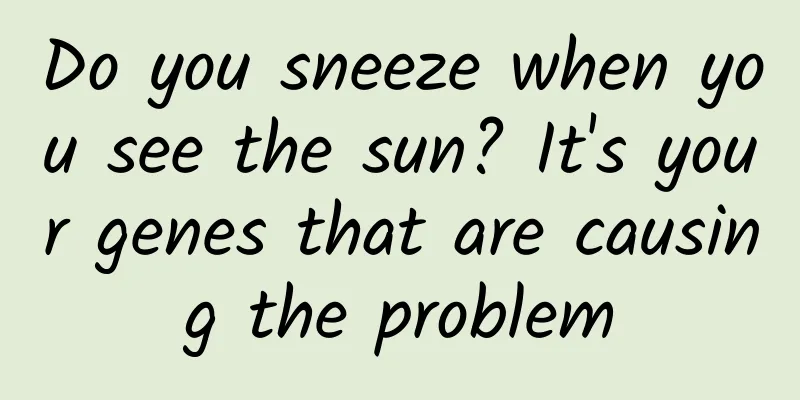Do you sneeze when you see the sun? It's your genes that are causing the problem

|
Sneezing is a normal physiological phenomenon, but in some situations, we always sneeze inexplicably, such as: Coming out of the dark movie theater, a bright light blinded my eyes—A-choo! I walked out of the office where I had been all morning, looked up at the clear sky and - A-choo! I don’t have a cold or any allergies, so why did I start sneezing for no reason? In fact, this phenomenon of sneezing when seeing strong light is called the photic sneeze reflex. It also has another fancy name - Autosomal Dominant Compelling Helio-Ophthalmic Outburst Syndrome, or ACHOO for short. Yes, that's the sound of sneezing: aaa~qiooooo~~~ What is the reason for sneezing when exposed to light? "Sneezing when exposed to light" is actually not a new topic. As early as the ancient Greek period, people had thought about this phenomenon. Aristotle once mentioned in the Book of Problems: "Why do some people sneeze after looking at the sun? This feeling is like scratching the nose with a feather. This is because the heat of the sun atomizes the liquid in our nasal cavity, and these gases stimulate the nasal mucosa when escaping the nasal cavity, causing us to sneeze." In the 20th century, British philosopher Francis Bacon questioned Aristotle's explanation, which said that even if a person closed their eyes and faced the sun, they would still sneeze due to the heat of the sun, but this was not the case. Francis Bacon believed that the strong sunlight caused the eyes to secrete tears, and some of the tears flowed into the nasal cavity, making the nose itchy and causing sneezing. But Bacon's explanation was soon overturned, because the process from sunlight stimulation to sneezing happened almost instantly, and the tears did not have time to flow into the nose. With the development of modern neurobiology, scientists have given a more credible explanation for the light sneeze reflex: the brain, as the highest ruling center of the human body, receives information from all parts of the body, analyzes the information and then issues commands to the body to respond accordingly. Different information is uploaded and sent down through different routes. When the nasal cavity is stimulated by foreign objects or cold air, this feeling will be reported to the brain through the trigeminal nerve. After receiving the information, the brain immediately issues an order to expel the adverse stimulation from the nasal cavity, and the way to expel it is to sneeze. The whole process is a perfect self-protection of the human body. Because the trigeminal nerve is close to the optic nerve, when strong light enters the eye, the optic nerve should normally transmit information to the brain, and then the brain will make instructions such as shrinking the pupil and squinting the eyes to prevent the strong light from damaging the eyes. However, because these two nerves are too close to each other, the brain may be confused when receiving information and mistakenly take the strong light signal transmitted by the optic nerve as a signal from the trigeminal nerve. Therefore, it mistakenly judges that the nose is irritated, and you start to sneeze. This is just like the "telephone cross-wires" in our lives. The bright light sneeze reflex can be considered as a "cross-wire" of neural circuits. Of course, not everyone can sneeze when exposed to light, and it can also be passed down to future generations! A genetic study in the 1960s showed that this "cross-wiring" between nerves is inherited in an autosomal dominant manner, so if your parents are prone to sneezing when exposed to bright lights, there is a high chance that you will also have this "ability". But don't worry, this "skill" has little impact on our daily lives and is not considered a disease. Image source: Wikipedia Sneezing in the light is not harmful, but some professions need to be careful Generally speaking, the optical sneeze reflex has little impact on our health and life. But for people in professions such as drivers and pilots, they need to pay attention. Think carefully, do you close your eyes unconsciously every time you sneeze? This is because when you sneeze, there is a lot of pressure in the lungs, mouth and nasal cavity. This huge force pushes the gas out of the body and also contracts the respiratory and facial muscles (if you sneeze slowly, you will find that your face will be deformed). Among them, the "orbicularis oculi muscle" responsible for controlling the closure of the eyes will also contract, and the eyes will close involuntarily. On the other hand, sneezing may seem fast, but it requires the nervous system to concentrate highly, and closing the eyes can also reduce external interference. For some jobs that require high concentration, the momentary closure of eyes due to the photorotatory sneeze reflex may have serious consequences. For example, when driving a car in a poorly lit tunnel, if the sudden strong light triggers the driver's photorotatory sneeze reflex at the moment of leaving the tunnel, the temporary closure of eyes may lead to a traffic accident. For fighter pilots, if they encounter sudden strong light at a critical operation point, the phototropic sneeze reflex may also bring risks. For safety reasons, drivers and pilots usually wear sunglasses during clear days, not for styling, but to block the glare of the sun. In short, "sneezing in the light" is not a disease, nor is it a "skill" that everyone can possess. If you want to know whether you have this "skill", you can try looking at the direction of the sun (protecting your eyes is a prerequisite). Reviewer: Yin Tielun, deputy chief physician of the Department of Neurology, Peking University Third Hospital Airport Branch END Tadpole Musical Notation original article, please indicate the source when reprinting Editor/Heart and Paper |
>>: Can controlled nuclear fusion become a reality?
Recommend
Serious security risks! 1 in 20 Android phones is rooted
Duo Security researchers have revealed that many i...
Baidu bidding ocpc full optimization guide
In this issue, we will not talk about anything el...
Does Apple have the courage that Google had to leave China?
In the context of economic globalization, the &qu...
Lake Nyos incident: The lake did not overflow, but more than a thousand people suffocated to death
In the summer of 1986, a villager near Lake Nyos ...
Another friend has quit his job to start his own media. Can self-media really make money?
To answer this question, we need to have a compre...
Without refrigerators, how did the ancients preserve food? They came up with 7 ways
Some people ask, since there was no such thing as...
We found the customer base, but failed in the investment. Why is B2B marketing so difficult?
Under the new marketing concept, low-cost custome...
Just 10 minutes a day! This simple exercise keeps you away from cancer and cardiovascular disease!
Just 10 minutes of exercise can increase the numb...
14 amazing skills, information flow conversion increased by 100%!
This article is a summary of the book "The B...
How to find the most click-through creative ideas in Sogou bidding promotion background?
With the development of the advertising and marke...
How is household electricity generated? Let’s start with Faraday
We cannot live without electricity every day, and...
World Vitiligo Day丨Can vitiligo patients take vitamin C? The disappearance of white spots means the disease is cured? Stop spreading these rumors!
Is it good for patients with vitiligo to get more...
Life in space is full of fun!
How do astronauts live in space? Do they enjoy th...









